As with most years, 2020 has been a busy one for the Fordham research team. We published many groundbreaking studies, adding contributions to the evidence base on literacy, civic education, education funding, school choice, and gifted programs, among others. The pandemic has exacerbated many problems in our education system, including inequities in access to technology, but has also proven the adaptability of many talented and motivated educators and school leaders who responded well. Above all, it has shown how crucial it is to apply research-informed practices to keep kids learning during the Covid-19 crisis and beyond.
Here are the ten research studies, briefs, and books we published in 2020:
1. Great Expectations: The Impact of Rigorous Grading Practices on Student Achievement, by Seth Gershenson
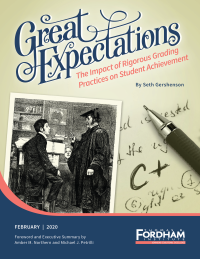
In our first study of the year, Seth Gershenson finds that rigorous graders improve their students’ outcomes in math end-of-course exams—and that effects continue for up to two years. This was true for students of all races, and it reiterates the importance of teachers’ high expectations and transparent grading practices to better serve students.
2. The Role of Advanced Placement in Bridging Excellence Gaps, by Chester E. Finn, Jr. and Andrew Scanlan
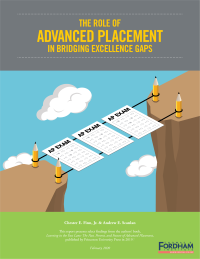
While this year has seen increased hostility towards schools and programs for talented students, Fordham believes in expanding access to challenging courses for all students. Checker Finn and Andrew Scanlan explain how enrollment in AP courses has increased among low-income and minority students, but stress the need to add more supports for disadvantaged students to close the gap in test scores.
3. How to Educate an American: The Conservative Vision for Tomorrow's Schools, coedited by Michael J. Petrilli and Chester E. Finn, Jr.
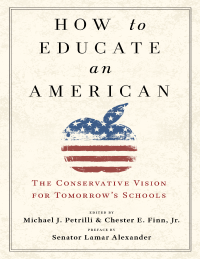
In this coedited volume with a preface by Senator Lamar Alexander, twenty leading conservative thinkers lend their thoughts on how schools can cultivate civic virtue and patriotism without glossing over the nation’s checkered past. This year has seen heightened divisions and uncovered many injustices, making this book all the more relevant to educators and district and school leaders.
4. What You Make Depends on Where You Live: College Earnings Across States and Metropolitan Areas, by John V. Winters
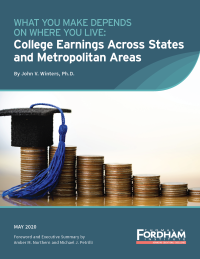
This study on college earnings by John V. Winters finds that bachelor’s degree-holders out-earn peers with less education, but there is significant variation between regions. On that note, we hope young Americans begin to consider where they intend to live and work when making their postsecondary education plans.
5. The State of the Sunshine State's Standards: The Florida B.E.S.T. Edition, by Solomon Friedberg, Tim Shanahan, Francis Fennell, Douglas Fisher, and Roger Howe
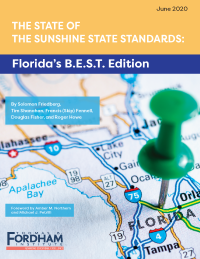
Florida Governor Ron DeSantis promised to replace the state’s Common Core-based math and reading standards with better ones. Unfortunately, our expert reviewers found the new standards lacking, and recommend significant and immediate revisions. This year has forced states everywhere to slow down and rethink how they do education, so we hope Florida takes this opportunity to improve its standards.
6. Moonshot for Education: A Federal Policy Proposal to Spur Effective Research and Development for K-12 Education, by the Thomas B. Fordham Institute and the Center for American Progress
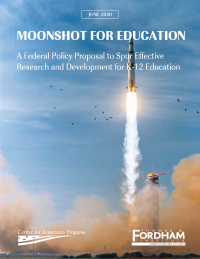
Across the nation, federal funds helped schools reopen, close the digital divide, transition to remote learning, and now, distribute a vaccine to end the pandemic. But what if the federal government invested in education-related R & D the way it does in other fields? The Fordham Institute published this bipartisan policy brief in partnership with the Center for American Progress with a vision for a federal program that will develop tools to make schools more adaptable and resilient in the future.
7. Getting the Most Bang for the Education Buck, coedited by Frederick M. Hess and Brandon L. Wright
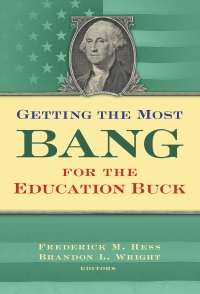
The Covid pandemic brought unemployment and decreased economic activity in its wake. This coedited volume brings the expertise of a dozen education experts to consider how schools and districts can cope with the coming drop in education revenue, covering topics such as how to leverage technology to improve staff performance, how parent input can inform district spending decisions, and how to get better results for students with disabilities.
8. Schooling Covid-19: Lessons from leading charter networks from their transition to remote learning, by Greg Vanourek
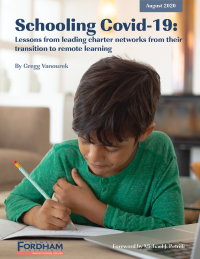
The transition to remote learning was hard for schools of all kinds—district, charter, and private. But there were some outstanding charter networks with quick and effective transitions that offer lessons for their peers. Greg Vanourek, one of the Fordham Institute’s founders, interviewed parents, teachers, and leaders from eight charter networks to learn about their approaches and see what they had in common.
9. Social Studies Instruction and Reading Comprehension: Evidence from the Early Childhood Longitudinal Study, by Adam Tyner and Sarah Kabourek
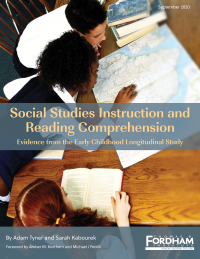
As the wars over literacy instruction rage on, the findings in this report by Adam Tyner and Sarah Kabourek support the importance of building background knowledge. The report finds that students who receive more social studies instruction have better reading outcomes, but finds little improvement for those whose schools spend more time on English language arts.
10. Teacher Effectiveness and Improvement in Charter and Traditional Public Schools, by Matthew P. Steinberg and Haisheng Yang
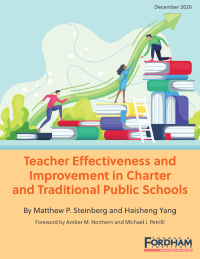
Charter networks tend to have more junior staff than district peers, so how is it that they tend to be more effective in boosting student achievement? This study looks at data from Pennsylvania and finds that teachers in charter networks improve on the job at much faster rates than those in standalone charters or traditional public schools, especially in math. Yet again, we see that offering quality education options helps everyone out by encouraging others to learn from their successes.
Stay tuned for another slate of rigorous, relevant studies from the Thomas B. Fordham Institute in 2021!


